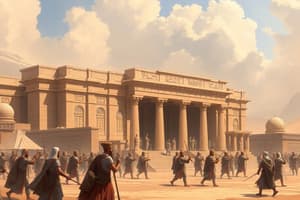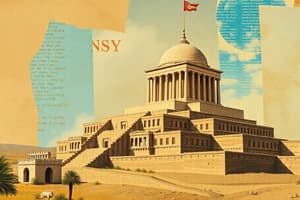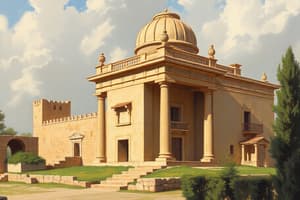Podcast
Questions and Answers
What type of bricks were specifically used for decorative purposes in ancient Assyria and Babylon?
What type of bricks were specifically used for decorative purposes in ancient Assyria and Babylon?
- Kiln-dried bricks
- Reinforced bricks
- Sun-dried bricks
- Color-glazed bricks (correct)
What was a key architectural response to the flooding conditions in Assyria and Babylon?
What was a key architectural response to the flooding conditions in Assyria and Babylon?
- Constructing underground chambers
- Creating multiple stories in buildings
- Building ziggurats on platforms (correct)
- Using mud for foundations
Which materials were primarily used by the Persians in their architectural designs?
Which materials were primarily used by the Persians in their architectural designs?
- Timber and colored limestone (correct)
- Ceramics and asphalt
- Sandstone and granite
- Mud and straw
What was a common architectural feature in buildings due to the desert conditions experienced by the Persians?
What was a common architectural feature in buildings due to the desert conditions experienced by the Persians?
What type of artwork was commonly used in the doorways of Persian palaces?
What type of artwork was commonly used in the doorways of Persian palaces?
Which characteristic is specifically associated with the architectural style of Babylon?
Which characteristic is specifically associated with the architectural style of Babylon?
What decorative element was commonly used in Babylonian palaces and temples?
What decorative element was commonly used in Babylonian palaces and temples?
What is the capital of ancient Babylonia?
What is the capital of ancient Babylonia?
Which best describes the wall construction technique found in ancient Babylon?
Which best describes the wall construction technique found in ancient Babylon?
Which of the following animals was NOT typically represented in Babylonian decorative friezes?
Which of the following animals was NOT typically represented in Babylonian decorative friezes?
Which achievement is attributed to King Nebuchadnezzar II?
Which achievement is attributed to King Nebuchadnezzar II?
What significant legal advancement is associated with King Hammurabi?
What significant legal advancement is associated with King Hammurabi?
Which construction method is primarily associated with the architectural style of Persia?
Which construction method is primarily associated with the architectural style of Persia?
Which of the following rulers is known for transferring the Assyrian Empire's capital?
Which of the following rulers is known for transferring the Assyrian Empire's capital?
Who completed the construction of the Hall of the Hundred Columns?
Who completed the construction of the Hall of the Hundred Columns?
What is the primary purpose of constructing a ziggurat in ancient Babylonian culture?
What is the primary purpose of constructing a ziggurat in ancient Babylonian culture?
Which of the following cities is NOT associated with the Sumerian civilization?
Which of the following cities is NOT associated with the Sumerian civilization?
What architectural feature is characteristic of Sumerian temples?
What architectural feature is characteristic of Sumerian temples?
Which statement best describes the construction practices of Sumerians?
Which statement best describes the construction practices of Sumerians?
What material was primarily used for the facing of Sumerian temples to enhance durability?
What material was primarily used for the facing of Sumerian temples to enhance durability?
What was the primary purpose of the Hall of the Hundred Columns during its use?
What was the primary purpose of the Hall of the Hundred Columns during its use?
Who initiated the construction of the Hall of the Hundred Columns?
Who initiated the construction of the Hall of the Hundred Columns?
What unique feature characterized the capitals of the columns in the Hall of the Hundred Columns?
What unique feature characterized the capitals of the columns in the Hall of the Hundred Columns?
Which Persian ruler is highlighted for serving as the architect of the treasury?
Which Persian ruler is highlighted for serving as the architect of the treasury?
What function did the treasury serve in ancient Persian architecture?
What function did the treasury serve in ancient Persian architecture?
Flashcards are hidden until you start studying
Study Notes
Geological and Climatic Influences
- Assyria and Babylon utilized clay for brick production, with sun-dried bricks for basic construction and kiln-dried bricks for important structures.
- Color-glazed bricks were popular for decorative uses in architectural designs.
- Persian architecture featured timber and colored limestone, adapting to local resources.
- In Assyria and Babylon, temples were built on platforms to mitigate flooding risks.
- Ziggurats, a significant architectural feature, were designed as elevated temples aimed at closer proximity to the divine.
- Persian architecture favored open-type buildings to address extreme heat conditions.
- Courtyards were commonly integrated into building designs to adapt to desert climates.
Religious and Cultural Elements
- Winged lions, bulls, and mythological monsters were used in Persia for decorative purposes on palatial doorways.
- Ziggurats served a spiritual purpose, intended to bring worshippers closer to heaven.
Historical Overview of Civilizations
- Sumerians, including cities like Kish, Uruk, and Ur, are noted for monumental temples made from sun-dried bricks, often faced with burnt or glazed bricks.
- Notable Sumerian architecture includes the High Temple at Khafaje, built on earlier structures.
Key Personalities and Contributions
- King Ur-Nammu of Sumer is credited with the Great Ziggurat of Ur.
- King Nebuchadnezzar II of Babylon oversaw the Great Palace, Ishtar Gate, and the Hanging Gardens.
- King Hammurabi is recognized for creating the earliest known codification of laws, known as Hammurabi's Code.
- Sargon II built the Palace of Sargon in Khorsabad.
- King Sennacherib moved the Assyrian capital to Nineveh.
- Cyrus the Great is regarded as the founder of the Persian Empire.
- Xerxes I advanced the construction of Persepolis, including the Hall of the Hundred Columns and the Gate of All Nations.
- Artaxerxes I completed the construction of both the Palace of Persepolis and the Hall of the Hundred Columns.
Architectural Differences
- Babylonian and Assyrian structures employed arch and vault techniques with buttressed walls.
- Persian architecture was characterized by columnar and trabeated designs.
- The Hall of the Hundred Columns, also known as the Throne Hall, served as a significant reception area and armory, featuring ornate capitals with double bull and double unicorn motifs.
- Darius I established a treasury within the Hall of the Hundred Columns, utilized also as an armory and storehouse.
Studying That Suits You
Use AI to generate personalized quizzes and flashcards to suit your learning preferences.




